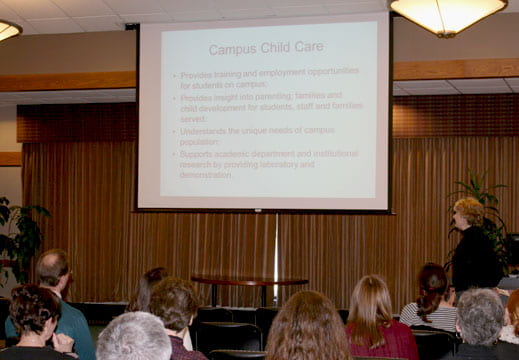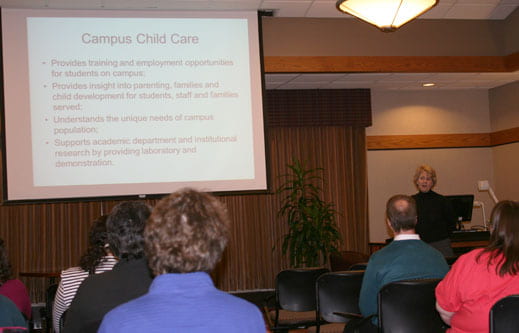UW-Green Bay hears pros, cons of child care options

Nearly 50 UW-Green Bay staff and faculty members, students and student government leaders, administrators and interested citizens turned out for an informational forum Feb. 4 on the topic of child care on the UW-Green Bay campus.
The 90-minute, mid-afternoon session took place in the 1965 Room of the University Union. It was co-hosted and moderated by Lynn Edlefson (presenting, above), who for 16 years has served as director of the Office of Child Care and Family Resources at UW-Madison.
Edlefson is among the professionals UW-Green Bay has consulted in exploring possible resumption of University-affiliated childcare. Vice Chancellor Kelly Franz told forum attendees he also has worked extensively with UW-Milwaukee’s Pam Boulton; some of her UW System counterparts describe Boulton as unofficial “dean” of the state’s campus child care professionals, in recognition of her 40-year tenure as a faculty member and director of the UWM Children’s Center.
Boulton was unable to attend the forum, but presenters Franz and Edlefson said her views were reflected in the informational slideshow that accompanied their talk.
Franz opened the presentation with a little history, describing how the UW-Green Bay Children’s Center closed its doors nearly two decades ago because of a deteriorating building and annual operating deficits. It has been UW System practice in recent years, he said, to withhold state tax-revenue support from such building projects and insist instead on funding from private gifts or student fees.
In recent years at UW-Green Bay, Student Government Association leaders and others have encouraged the University to revisit the concept of an on-campus service.
Edlefson addressed the results of a survey of potential user demand at UW-Green Bay. That exercise, in fall 2011, found general support, but Edlefson cautioned that “while people often like the idea” of an on-campus center, “they don’t always make the switch.” Relatively few will actually follow through and transfer their children in from their existing providers. Some estimates put the yield as low as 10 to 15 percent. It was also noted that many new centers operate at half or three-quarters capacity their first year.
Franz, UW-Green Bay’s vice chancellor for business and finance, put construction costs of a new facility on the UW-Green Bay campus at $1.5 million for a 90-child center. (Retrofitting or repurposing existing space is often not a preferred option because of cost and suitability issues.)
Edlesfson oversees seven campus-based centers at UW-Madison and administers additional programs that contract with private providers or offer student parents a direct subsidy. User fees and ongoing support from UW-Madison’s segregated fee allocations make up nearly all of her budget.
Edlefson said it was her impression from meeting with people at UW-Green Bay that there is significant interest across the institution —University leadership included —in resuming campus-based service.
“Everyone wants quality child care, everyone wants to have a good experience for the children, everyone would welcome something that can help these students and parents,” she said. “The reality, though, is in the end it is a business. It has to be sustainable or it doesn’t work.”
Both Franz and Edlefson said that campus centers face a delicate balancing act in setting aside enough spots for full-time, year-round children — the stable enrollments that tend to pay the bills — while still maintaining capacity for the sporadic, short-time drop-ins that many student parents prefer.
In the question-and-answer period that followed the presentation, several in the audience, both employees and students, said they would welcome the practicality of on-campus child care. One faculty member cited the example of a commuting student who regularly missed significant class time because her hometown center didn’t open early enough to provide time for the long drive to Green Bay.
Discussion also touched upon the likelihood that a student body with a majority of traditional-age, childless students would endorse a student fee increase — for discussion purposes, estimates ranged from $20 to roughly $60 annually — when escalating college costs are an increasing concern. Opinions differed.
Edlefson, the UW-Madison staff member, encouraged UW-Green Bay advocates to also consider additional options.
With student fee support, the institution could contract with privately run facilities nearby to hold slots open for student parents. Students who use such a service could be partially subsidized and reimbursed by way of a voucher system.
The slideshow noted that the Green Bay community has a relatively high percentage of accredited, solidly rated child care centers — better than other parts of Wisconsin — and that operators of those centers report some excess capacity.
With regard to the experience of other institutions across the UW System, Edlefson described a mixed bag. Some campus centers appear to be thriving, while others find themselves at a crossroads. Eau Claire and Oshkosh, she said, have recently or will soon expand to new facilities, but she also cited two smaller campuses with ongoing facility and deficit challenges. Another institution, UW-Superior, does not have a campus-based center but instead contracts with a private provider.
The forum closed with the question, “What’s the next step?”
Edlefson encouraged advocates to be more specific, to narrow their objectives and be more precise, for example, in projecting potential usage by students vs. employees, daily hours of operation, maximum capacity, whether summers and holidays and occasional extended hours would be covered, and more.
She also said a grassroots campaign for a facility would likely need a financial commitment from the project’s friends and advocates — “even if you only raised, say, $57, at first… that’s a start” — to demonstrate that supporters are serious.
Chancellor Tom Harden, who attended the session, said he looks forward to future discussions with UW-Green Bay Student Government reps and other interested parties. Franz, who has taken a lead in gathering background on the child care issue through his vice chancellor responsibilities related to facilities, said he would welcome additional feedback, as well, at FranzK@uwgb.edu


